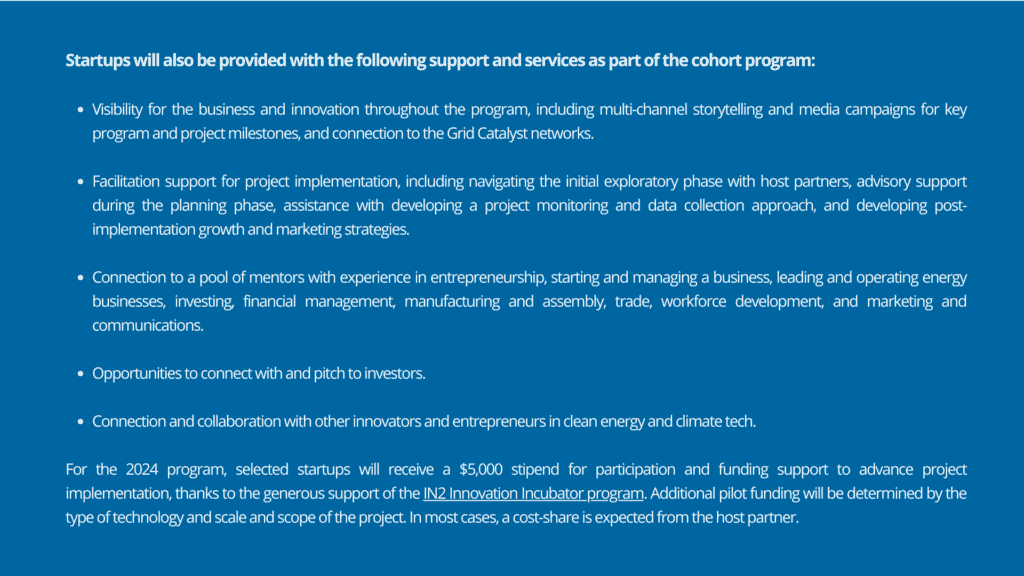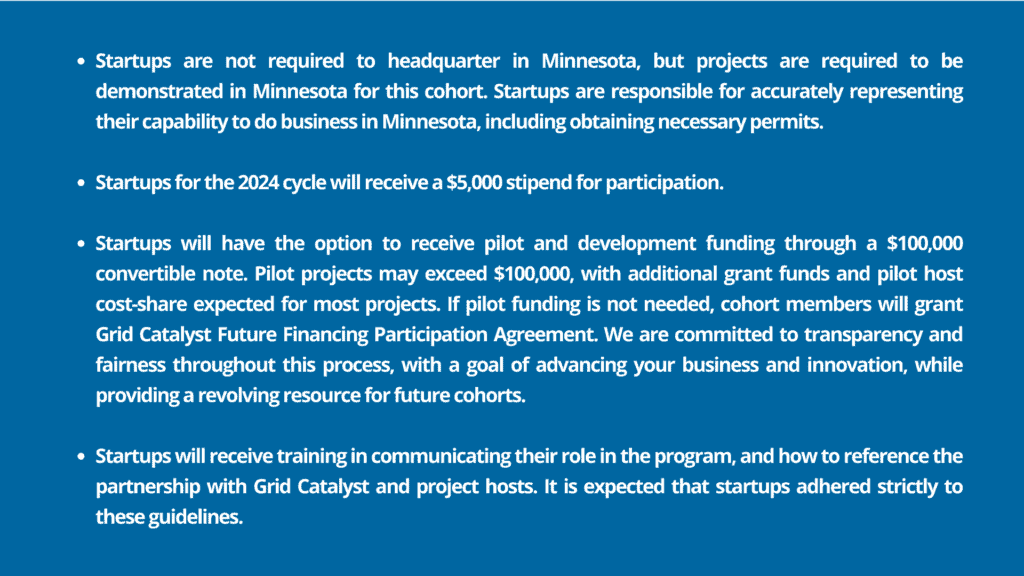Demonstration Cohorts
Are you pilot-ready?
Grid Catalyst is one of the only accelerator programs in the country providing pilot project opportunities for late-stage startups with market-ready prototypes. Our program matches promising innovators with Minnesota-based partners interested in demonstrating emerging technology on the path to commercialization. We recognize that pilot projects are key to bridging the commercialization valley-of-death and have customized a program to help startups with proof-of-concept in real-world applications.
2024 Demonstration Cohort
We are thrilled to welcome six startups into the 2024 Demonstration Cohort, working with partners across the State of Minnesota to demonstrate their cutting-edge technologies. Meet the cohort.
Thanks to our partners in Minnesota Energy Alley for the seed funding making this year’s projects possible.
Applications for the 2025 cohort will open in June. Subscribe to stay updated on the program.
A Program Focused on Late-Stage Startups
Our Demonstration Cohort is catered for late-stage businesses that have a pilot-ready prototype or have already initiated demonstration or commercialization projects that will benefit from a higher visibility installation and from participation in our accelerator program. Startups selected as finalists will have the opportunity to pitch to major utility, business, higher education campus, community, or nonprofit from our Innovators Network. Startups qualify for our cohort if an Innovators Network partner selects them for development of a pilot project.

Qualifications
For the demonstration cohort, startups must meet these qualifications:
- Have a solution that can be implemented in a demonstration project in 2024.
- Can legally demonstrate and manage a project in Minnesota. We are not considering projects in other states for this round of programming.
- Have secured any necessary patents for their solution or are in the process of securing patents, if applicable.
- If the solution is a product or technology (rather than a service), there must be a prototype version that can function in a pilot (technological readiness level of 6 or above). If your current prototype is for testing purposes only, please consider applying to a future cycle.
- The organization has fewer than 100 employees. Startup definitions can vary, so we are using this threshold to identify smaller businesses who might benefit most from our program.
Selection Considerations
Grid Catalyst is committed to creating impact with our platform, which requires us to consider several key criteria throughout the screening process:
Innovation
How unique is your value proposition and how does it compare to other market offerings?
Impact
When implemented, what potential impact will your solution have in addressing carbon and climate change, creating a more equitable and just energy system, and bolstering local communities, regional economics, and workforce development?
Equity and Access
We are seeking startups with diverse founders and representation on their leadership team, recognizing that these startups have unique needs and opportunities, and have historically been underrepresented and under-resourced in the startup and energy communities. To address climate change and create a more equitable energy system, it’s essential that we create pathways for diverse founders to bring their ideas and solutions to the market.
Viability
We are establishing a new methodology for accelerating clean energy solutions, so it is important that our team has a rigorous process to establish technical and financial viability for our startups. However, we know that the scientific process, product and business development, and demonstration will have failures on their way to success. This work will be done with great intention to balance these dynamics and put projects on their best path to reliable implementation.
Matchmaking with Innovators Network
The Innovators Network was built in advance of the cohort application process so we could purposefully recruit for technologies and solutions that fit the priorities of our partners. If a technology or solution shows promise, but is not an automatic fit with a current program host, we will still work with that startup to explore other ways to advance their development.
Preferred Qualifications
Grid Catalyst seeks to be a transformative program that uses its resources and capabilities to elevate startups with both unique needs and unique ideas. As part of this commitment, we are prioritizing diverse founders in our application process and encouraging startups led by people of color, women, and LGBTQIA+ to apply. We will also be developing additional programming and resources for diverse founders beyond this demonstration cohort, so invite these leaders to reach out to our program staff to discuss how we might work together to develop your clean energy or climate tech idea or solution.
Information Sessions
If you aren’t sure whether you qualify, or just want to learn more about our program, please consider attending one of our program information sessions. We encourage innovators at any stage to attend the session and learn more about the accelerator platform and experience, as well as future plans to work more with earlier stage ventures.
Meetings are held in Central Standard Time and via Zoom.
June 29, 2023 – 10:00-11:00 AM – Register
July 6, 2023 – 2:00-3:00 PM – Register
July 17, 2023 – 11:00 AM-noon – Register
If you cannot attend one of the scheduled information sessions but would like to chat with program staff, reach out to info@gridcatalyst.org to schedule and learn more.
Program Terms & Conditions

Frequently Asked Questions
How Many Startups Will Participate in the 2024 Demonstration Cohort?
We anticipate selecting 4-6 startups for the 2024 Demonstration Cohort.
Does My Startup Have To Be Incorporated to Participate?
For the 2024 Demonstration Cohort, yes. Future programming may allow for earlier stage ventures.
Does My Startup Have to Be Headquartered or Doing Business in Minnesota?
No, there will be spots for companies based outside of Minnesota in the 2024 Demonstration Cohort. However, preference may be given to Minnesota-based companies. Also, companies from out-of-state must explain how they can manage a project in Minnesota, including how they will plan for time at project sites and working with partners. Companies must be legally eligible to do business in Minnesota, including necessary licensure and permitting requirements.
Are Service-Based Companies Eligible to Apply?
Yes, services are also a crucial way that we can address climate change. However, the service must be an emerging solution that is new-to-market and would benefit specifically from our program structure. If the service requires software, that software must have a prototype in place for a 2024 project.
How Developed Must My Solution Be to Participate in the Cohort?
If the solution is a product or technology (rather than a service), there must be a working prototype. Future cohorts will consider earlier stage ventures. The company is not required to have an existing demonstration or commercial project.
Are Certain Types of Technologies of Greater Interest?
All emerging clean energy technologies that address climate change are eligible. The team will need to consider the impact and viability of certain categories, particularly those with longer development cycles and permitting and regulatory requirements. High-potential technology categories: grid advancement and adaptation, renewable thermal, building electrification, EV charging, energy efficiency, small-scale batteries, and controls and metering.
Program Partners
This demonstration cohort cycle is made possible through a partnership with the Wells Fargo IN2 Innovation Incubator. Grid Catalyst is proud to be a Channel Partner, in collaboration with the University of Minnesota Technological Leadership Institute.
The Wells Fargo Innovation Incubator (IN2) is a technology incubator for cleantech startups. Co-founded and co-administered by the National Renewable Energy Laboratory (NREL) since 2014, its results are transformative and catalytic.
In addition, we are grateful to the dozens of partners in our Innovators Network, who lend their expertise, support, and facilities to enable these demonstration projects.
Stay Connected
Sign up for program announcements.
"*" indicates required fields


